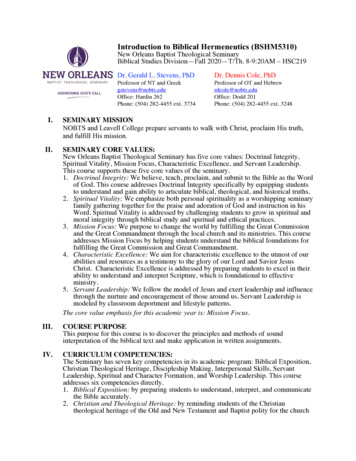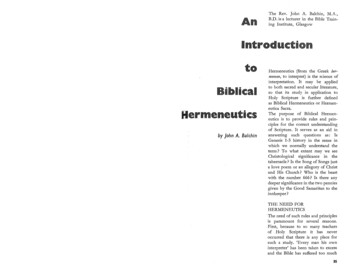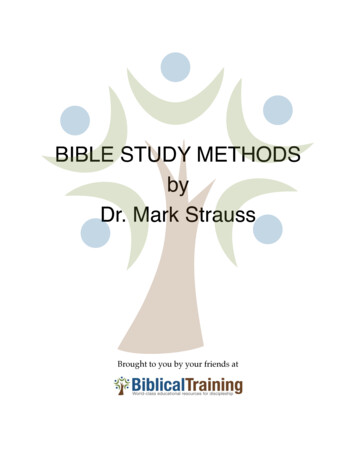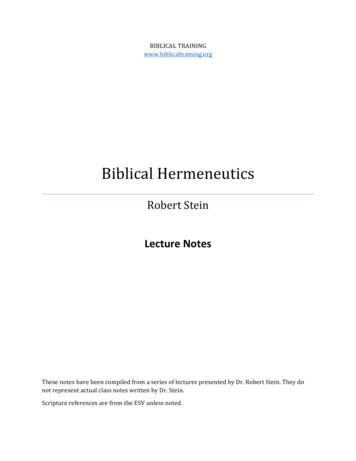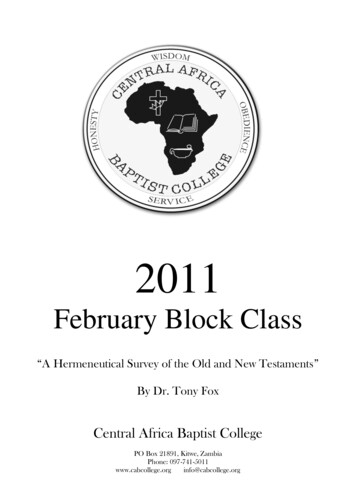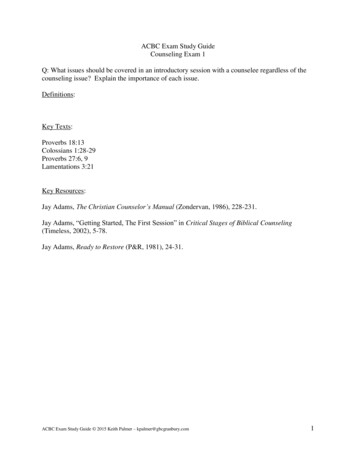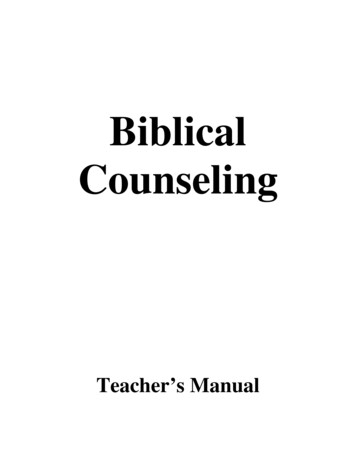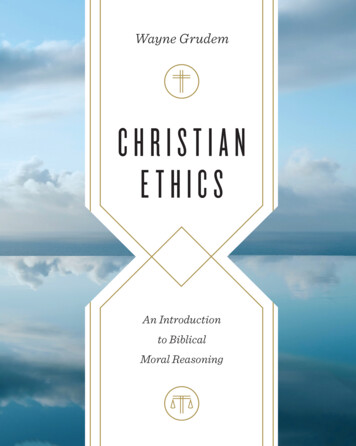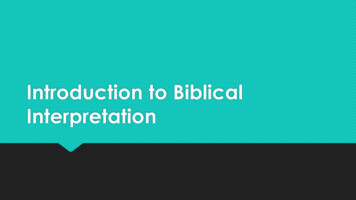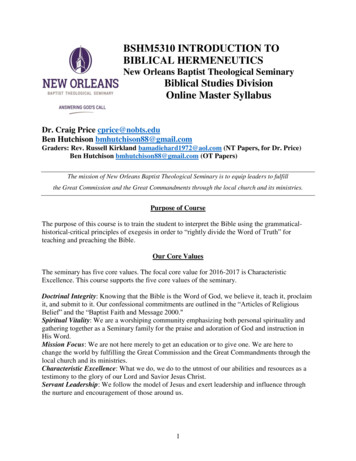
Transcription
BSHM5310 INTRODUCTION TOBIBLICAL HERMENEUTICSNew Orleans Baptist Theological SeminaryBiblical Studies DivisionOnline Master SyllabusDr. Craig Price cprice@nobts.eduBen Hutchison bmhutchison88@gmail.comGraders: Rev. Russell Kirkland bamadiehard1972@aol.com (NT Papers, for Dr. Price)Ben Hutchison bmhutchison88@gmail.com (OT Papers)The mission of New Orleans Baptist Theological Seminary is to equip leaders to fulfillthe Great Commission and the Great Commandments through the local church and its ministries.Purpose of CourseThe purpose of this course is to train the student to interpret the Bible using the grammaticalhistorical-critical principles of exegesis in order to “rightly divide the Word of Truth” forteaching and preaching the Bible.Our Core ValuesThe seminary has five core values. The focal core value for 2016-2017 is CharacteristicExcellence. This course supports the five core values of the seminary.Doctrinal Integrity: Knowing that the Bible is the Word of God, we believe it, teach it, proclaimit, and submit to it. Our confessional commitments are outlined in the “Articles of ReligiousBelief” and the “Baptist Faith and Message 2000."Spiritual Vitality: We are a worshiping community emphasizing both personal spirituality andgathering together as a Seminary family for the praise and adoration of God and instruction inHis Word.Mission Focus: We are not here merely to get an education or to give one. We are here tochange the world by fulfilling the Great Commission and the Great Commandments through thelocal church and its ministries.Characteristic Excellence: What we do, we do to the utmost of our abilities and resources as atestimony to the glory of our Lord and Savior Jesus Christ.Servant Leadership: We follow the model of Jesus and exert leadership and influence throughthe nurture and encouragement of those around us.1
Curriculum Competencies AddressedNOBTS faculty members realize that all ministers need to develop specific competencies if theyare going to have an effective ministry. To increase the likelihood of NOBTS graduates havingan effective ministry, the faculty developed a competency-based curriculum after identifyingseven essential competencies necessary for effective ministry. All graduates are expected to haveat least a minimum level of competency in all of the following seven areas:Biblical Exposition: To interpret and communicate the Bible accurately.Christian Theological Heritage: To understand and interpret Christian theological heritage andBaptist polity for the church.Disciple Making: To stimulate church health through mobilizing the church for missions,evangelism, discipleship, and church growth.Interpersonal Skills: To perform pastoral care effectively, with skills in communication andconflict management.Servant Leadership: To serve churches effectively through team ministry.Spiritual and Character Formation: To provide moral leadership by modeling and mentoringChristian character and devotion.Worship Leadership: To facilitate worship effectively.The primary curriculum competency addressed in this course is Biblical Exposition.Course Catalog DescriptionThis course includes a study of the principles of biblical interpretation, an introduction to themajor resources available as an aid to biblical interpretation, and an exegetical study of selectedpassages from the various genres of biblical literature. Some attention is directed to currentissues in biblical hermeneutics, but the major focus of the course is practical in nature in that thegoal of the course is that the students develop a sound method for exegesis of the biblical texts.Student Learning Outcomes1.2.3.The student will be able to understand the principles guiding the exegetical processfor biblical interpretation.The student will be able to use appropriate tools, resources, and methods to applysound exegetical principles toward biblical interpretation.The student will be able to communicate clearly the meaning of the biblical text to acontemporary audience.Required Textbooks1. Holy Bible. In modern translation: RSV, NRSV, NASV, NIV, GNB, ESV, NLT, etc.2. Gordon Fee and Douglas Stuart, How to Read the Bible for All Its Worth, 4th ed. (FS)3. J. Scott Duvall and J. Daniel Hays, Grasping God’s Word, 3rd ed., Zondervan, 2012 (DH)Optional Recommended TextbooksThese textbooks may be used for the extra credit project (see below page 7).2
1. Gerald Bray, Biblical Interpretation: Past and Present (GB)2. Klein, Blomberg, and Hubbard, Introduction to Biblical Hermeneutics (KBH)3. Stanley Porter and Beth Stovall, Biblical Hermeneutics: 5 Views, Intervarsity Press, 2013.(P&S)Help for Writing Papers at “The Write Stuff”This is the official NOBTS Writing Center online help site for writing academic papersand essays. http://www.nobts.edu/writing/default.html You will discover writing guides,tips, and valuable information to help you become a better writer. Go here for Turabianand APA style helps and guidelines. You will also find language fonts for Greek andHebrew. Be advised that the Writing Center has a two (2) paper limit per student, persemester.Plagiarism on Written AssignmentsNOBTS has a no tolerance policy for plagiarism. Please be aware that plagiarism incertain cases may result in expulsion from the seminary. Refer to the NOBTS StudentHandbook http://www.nobts.edu/ re the definition, penalties and policies associated with plagiarism are clearly defined.Course RequirementsThe following components comprise the student’s grade for the course. Grades for eachcomponent will be calculated on the basis of the following percentages. Due dates are given inthe Course Schedule below.1. Reading Quizzes (10%)Students are to read the portions of the required texts by the date specified in the courseschedule. A quiz will be opened for the student to take for the section of readings as outlined inthe course schedule below and will be taken during the week of the unit covered. These quizzesare open book, but are timed. The questions will come directly from the textbook readings for theUnit of the current week. The quizzes are open book and timed. A good strategy would be toread the chapters for the Unit, watch the audio power points for the chapters and mark yourtextbook with information from the slides. Then, take your reading quiz. Due Weekly.2. Application Exercises (10%)The student will participate in Application Exercises for most Units. These exercises aredesigned to support the class materials from the Duvall & Hays textbook. You will find theassignments at the end of each chapter in the DH 3rd edition text. Blackboard will instruct youfor which questions to answer in each Unit. For each assignment, you will need to prepare aWord file containing the scripture verses for the exercises. You will follow the instructions foreach week and do the work on the passage. In order to upload your assignment to Blackboard,you will need to scan your completed work and save it as a pdf. If you don't have a scan functionon your printer, you can use apps like EverNote, CamScanner, Tiny Scanner, etc. on your smartphone. Use the app to scan your finished work and email it to yourself.3
Upload your weekly application exercises you are working on for that week. These assignmentsare designed to give you hands-on experience with the concepts learned in the DH readings.This assignment is due each week by the Saturday night of the weekly Unit. Check the syllabusCourse Schedule for dates. See Grading Rubric associated with your DB. Deductions will bemade for late work. Due weekly.3. Background Study Paper (20%)A word about format and style: The paper is to be double-spaced, Turabian or APA format,Times New Roman 12pt font, 2000 words total including cover page and bibliography. Pleaseuse a minimum of 5-6 academic resources excluding Bibles and Study Bibles (Refer to NewTestament and Old Testament Bibliographies in Helpful Guides and Documents). MostDivisions in NOBTS use Turabian Style for writing papers. If your Division uses APA style, wewill accept this for your papers. All Biblical Studies majors should use Turabian. Regardless ofthe style you use, be consistent throughout your assignments. Because all students takeIntroduction to Biblical Hermeneutics, we want you to focus on learning to do solid exegesis onthe Bible, rather than spending extra time learning a new style for writing. Be sure to reach out toyour individual professors if you are uncertain which style you should use for this course.Always write a cover page for your written assignments. Refer to the example in Blackboard as aguide.The Background Study Paper: The historical-critical/grammatical method of exegesis beginswith a review of the historical background of the book being studied. The purpose of abackground study is to determine the proper setting for your particular book and passage. Thisinformation may be found in the major commentaries, dictionaries, and encyclopedias for yourpassage. The historical background study should include the following: Historical information on the setting, authorship, readership, date and place of writing ofthe letter, etc. Information on the critical issues of the passage. These may vary and will be discussed inthe major commentaries, dictionaries, and encyclopedias for your passage. Critical issuesmay range from controversies over authorship, time of writing, theological issues,difficult subjects, etc. Every Bible book or letter is different. A discussion of the theological issues covered in the passage. A section where you focus upon your specific background topic as indicated in the Biblepassages below (see the list below).Paper Topics for the Semester: Select OneSelect a passage that you will use for your Background Paper, Word Study Paper, Stage OnePaper, and Stage Two Paper in this course (see list on the next page). Note that your word studytopic word has been preselected for you. When you write your background paper, you will alsoneed to include discussion on the specific background focus for your passage.4
Old TestamentNarrativeWord Study Paper Topic:Paper Focus:Ruth 3:1-18“Kinsman Redeemer” (v. 28), goel,Levirate MarriageLawWord Study Paper Topic:Paper Focus:Exodus 19:1-8“Covenant” (v. 5), berithCovenants in the OTPoetryWord Study Paper Topic:Paper Focus:Psalm 18:1-19“Sheol” (v. 5 ), sheol,Salvation in the OTWisdomWord Study Paper Topic:Paper Focus:Proverbs 3:13-18“Wisdom” (v. 13), chomah,Tree of Life in the OTProphecyWord Study Paper Topic:Paper Focus:Ezekiel 37:1-14“Spirit, spirit, wind, breath” (v. 1, 6, 9), ruahResurrection in the OTNew TestamentNarrative- GospelsWord Study Paper Topic:Paper Focus:Matthew 26:17-30Covenant, diatheke (v. 28)Passover Feast of the JewsNarrative- ParablesWord Study Paper Topic:Paper Focus:Luke 20:9-19Parable, parabole (v. 1)Meaning of parable and Tenant Farmers/Rich and PoorNarrative- HistoryWord Study Paper Topic:Paper Focus:Acts 8:4-25To Baptize, baptizo (v. 12)Samaritan-Jewish Relations in the First CenturyEpistleWord Study Paper Topic:Paper Focus:1 Timothy 2:8-15Silence, hesychia (v. 11)Role of Women in the Ancient Near EastEpistleWord Study Paper Topic:Paper Focus:1 Corinthians 7Not divorce/not separate, me choristhenai (v. 10)Marriage (critical passage for counseling issues)ApocalypticWord Study Paper Topic:Paper Focus:Revelation 4:1-11“Come up” anabaino (v. 1)Significance of this chapter to the 4 major views of Revelation5
4. Word Study Paper (10%)The historical-critical/grammatical view gives focus to word studies and what words meant inthe original context. The student will complete a word study on a word indicated from anassigned text The GGW textbook has a complete guide to performing a word study. Consult thatchapter in Duval & Hays.The paper is to be double-spaced, Turabian or APA format, Times New Roman 12pt font, 1000words total including the cover page and bibliography. Please use a minimum of 5-6 academicsources on this paper excluding Bibles and Study Bibles (Refer to New Testament and OldTestament Bibliographies in Helpful Guides and Documents). See schedule below for DueDate.5. Two Stage Exegesis Paper Project (40% Total for Two stages)Using the historical-critical/grammatical method of exegesis, the student will exegete theselected passage. The major project in the course is consists of a practical application in the formof an exegetical paper, which is to be produced in two stages. The detailed instructions arelocated at the end of the syllabus. (See Below)(1) Stage One (30%) – The first stage is a thorough exegetical study that is to follow theattached guidelines, double-spaced, Turabian or APA format, Times New Roman 12pt font,4000-4500 words total, including the cover page and bibliography. At the end of this stage, thestudent should have gathered all the essential knowledge from the text and be ready to begin thetask of constructing a sermon or a teaching lesson. Please use a minimum of 7-8 academicsources on this paper excluding Bibles and Study Bibles (Refer to the New Testament and OldTestament Bibliographies in Helpful Guides and Documents). There is a Guide provided for youin the Blackboard shell. (See the Short Guide to Writing Exegetical Papers in Bb. The ShortGuide has a breakdown of items for use in grading your paper). See schedule below for DueDate.(2) Stage Two (10%) – THIS IS THE EMBEDDED ASSIGNMENT. The second stage is apolished, written, double-spaced, Times New Roman 12pt font, 1500 words total paper(including the cover page and 1-page bibliography). Follow Turabian or APA format to cite yoursources.The purpose of this stage two paper is to synthesize the information you have gathered from thebackground paper, word study paper, and first stage exegesis paper into a well-writtenpresentation. Use the Embedded Assignment rubric below as a guide for writing this paper.Please use a minimum of 5-6 academic sources on this paper, not including your Bible or StudyBible information (Refer to the New Testament and Old Testament Bibliographies in HelpfulGuides and Documents for discovering sources). This stage should have an interestingintroduction, developed body, and a conclusion that ties the paper together. Indicate the use ofappropriate tools, methods, and resources in the application of sound exegetical principles.Communicate the meaning of the text, keeping in mind the contemporary audience. It may takethe form of a sermon manuscript (written out in narrative format), academic paper forpresentation, or teaching outline/paper manuscript (written out in narrative format).6
Embedded Assignment Grading RubricDOMAINLEVELINADEQUATE(0 POINTS)BASIC(1POINT)COMPETEN GOOD EXCELLENTT(3(4 POINTS)(2 POINTS) POINTS)UNDERSTANDINGThe Student:Understoodthe principlesguiding theexegeticalprocess forbiblicalinterpretationAPPLICATIONUsedThe Student:appropriatetools to applysoundexegeticalprinciplestoward biblicalinterpretationCOMMUNICATION CommunicatedThe Student:clearly themeaning of thebiblical text toacontemporaryaudience6. Comprehensive Final Exam (10%) – The final will include all material covered in theDuvall and Hays textbook Grasping God’s Word. The exam is open book, but it is timed.7. Additional Extra Credit Opportunity – Up to 3 points may be earned which will be added tothe student’s final average by doing an extra credit project. The extra credit project consists ofwriting a book review on any one of the three (3) Optional Recommended Textbooks listed aboveon page 3.The Extra Credit Book Review: The student will present a 1500-word total, double-spaced,Times New Roman 12 pt font, book review to receive full extra credit on this assignment. Thestudent will be awarded 1 point per 150 pages read up to 3 total points. State the thesis of the book State the author’s perspectives, strengths and weaknesses State how you would see the book applying to your ministry. Follow the guide for writing theological book reviews found in Course Documents Menu7
Course Evaluation PercentagesReading QuizzesApplication ExercisesBackground PaperWord Study PaperStage One Exegesis PaperStage Two Embedded Assignment PaperComprehensive Final Exam over Duvall & Hays10%10%20%10%30%10%10%Course PoliciesReading AssignmentsStudents are responsible for completing all reading assignments.Professor’s Policy on Late AssignmentsAll work is due at the beginning of class on the assigned day. The grade for lateassignments may be reduced by 5% per day late.Professor’s Availability and Assignment FeedbackThe student may contact the professor at any time using the email address provided in thecourse syllabus. The professor will make every effort to return answers to emailedquestions within a 24-hour period of time. Assignments requiring grading will bereturned to the student within a reasonable period of time. Student feedback on gradedassignments will be provided through the grading rubric located in the student’sBlackboard Grade Book. The student will find comments in the grading rubric, as well ason graded paper assignments. The student may also email the course grader withquestions regarding grading.Help for Writing Papers at “The Write Stuff”This is the official NOBTS Writing Center online help site for writing academic papersand essays. http://www.nobts.edu/writing/default.html You will discover writing guides,tips, and valuable information to help you become a better writer. Go here for Turabianand APA style helps and guidelines. You will also find language fonts for Greek andHebrew. If you are on campus, you can go by the Write Stuff Office in the StudentCenter for “in person” assistance.Academic Honesty PolicyAll graduate and undergraduate NOBTS students, whether on-campus, internet, orextension center students, are expected to adhere to the highest Christian standard ofhonesty and integrity when completing academic assignments for all courses in everydelivery system format. The Bible provides our standard for academic integrity andhonesty. This standard applies whether a student is taking tests, quizzes, exams, writingpapers, completing Application Exercises, or any other course requirement.8
Classroom Parameters (if applicable)Please arrive on time.Turn off cell phones. Utilize laptops and other technology for class purposes only.Respect the professor and other members of the class.Maintain confidentiality when someone shares personal information.Participate in class and group discussions.Extra CreditSee Course Requirements #7 for information on Extra Credit opportunities.Blackboard and ITC Technical SupportBlackboard is the instructional platform used in this class. Please make sure that yourcontact information is accurate and up-to-date. If you need assistance accessingBlackboard, Self-Serve, or other technical support, please contact the InformationTechnology Center (Hardin Student Center 290 or call 504.816.8180). Here are otherhelpful links to ITC assistance. Selfserve@nobts.edu - Email for technical questions/support requests with theSelfserve.nobts.edu site (Access to online registration, financial account, onlinetranscript, etc.)BlackboardHelpDesk@nobts.edu - Email for technical questions/support requests withthe NOBTS Blackboard Learning Management System NOBTS.Blackboard.com.ITCSupport@nobts.edu - Email for general technical questions/support requests.www.NOBTS.edu/itc/ - General NOBTS technical help information is provided on thiswebsite.For Student Assistance in using Blackboard, visit: Student Bb HelpOn-Line Resources: ces-anddatabases.htmlNetiquetteAppropriate Online Behavior. Each student is expected to demonstrate appropriateChristian behavior when working online on Application Exercises or wheneverinteraction occurs through web, digital, or other electronic medium. The student isexpected to interact with other students in a fashion that will promote learning andrespect for the opinions of others in the course. A spirit of Christian charity is expected atall times in the online environment.Academic Catalog PoliciesAcademic policies related to absences, grading scale, final examination schedules, andother topics can be found in the current online catalog: New Orleans Baptist TheologicalSeminary Academic Catalog.Web-based Course Reminder/WarningWeb-based courses are, by nature, a different kind of learning experience than coursestaught in the traditional classroom. Because of this structure, this web-based course is9
more reading and writing intensive than traditional classroom courses. Rigorous study ofthe deep things of God can be a rewarding experience for anyone who participates in it,but it also calls for extra diligence and integrity in completing the work. This reality doesnot mean that a web-based course cannot be successful in equipping you, the student, foreffective, God-honoring ministry. It simply means utilizing a different strategy. Internetcourses allow room for independent learners to thrive—to work at a responsible pace, toengage in student-led discussions, and to take ownership of the learning of coursecontent. Note that your instructors are praying for your success.Course ScheduleNote: Summer courses are 1/2 the duration of a regular semester. We will cover two units perweek, except for the last week. Each Unit begins on a Sunday (except for the 1st week) and endson the Saturday (except for the last week) of that given week. The due dates for assignments,quizzes, and Application Exercise entries will be the Saturday night at midnight for eachscheduled Unit. The last day of class ends on Friday!! Here are the calendar dates for the Unitslisted below:Week 1 Units 1 & 2Week 2 Units 3 & 4Week 3 Units 5 & 6Week 4 Units 7 & 8Week 5 Units 9 & 10Week 6 Units 11 & 12Week 7 Units 13 & 14Week 8 Unit 15Monday May 29-June 3June 4-10June 11-17*Background Paper Due SaturdayJune 18-24*Word Study Paper Due SaturdayJune 25-July 1July 2-8July 9-15*Stage 1 Paper Due Saturday (wk 7)July 16-Friday July, 21*Stage 2, Final, & EmbeddedAssignment Due Friday 11:59 PM (wk 8)For example, Unit 1 will begin on the opening day of the online course as stated in the NOBTSAcademic Catalog (see above under Academic Catalog Policies). Due dates will be the followingSaturday night at midnight. Final exams are due by midnight on the day internet courses close, aslisted in the Academic Catalog. The Information Technology Center will close all Blackboardshells at midnight Central Time on this date. Students will no longer have access to the Bb shellafter this time. Such dates will be listed in the NOBTS catalog.Unit Number:Unit 1TopicPart 1: How to Read the Book--BasicToolsCh 1 Bible Translations (DH)Ch 2 The Basic Tool – A Good Translation(FS)History of Interpretation (See Handout inCourse Documents) View Unit power point presentations10Reading AssignmentDH: Ch 1FS: Ch 2
Unit 2Post Application Exercise Unit 1-PostBy Saturday Night Midnight of ThisWeekTake Quiz #1- Take By SaturdayNight Midnight of This WeekPart 1: How to Read the Book--BasicToolsDH:Chapter 2FS: Chapter 1Ch 2 The Interpretative Journey (DH)Ch 1 The Need to Interpret (FS) Unit 3View Unit power point presentationsPost Application Exercise Unit 2-PostBy Saturday Night Midnight of ThisWeek Take Quiz #2- Take By SaturdayNight Midnight of This WeekDH: Ch 3Part 1: How to Read the Book--BasicDH: Ch 4ToolsCh 3 How to Read the Book - Sentences(DH)Ch 4 How to Read the Book - Paragraphs(DH) Unit 4View Unit power point presentationsPost Application Exercise Unit 3-PostBy Saturday Night Midnight of ThisWeekTake Quiz #3- Take By SaturdayNight Midnight of This WeekPart 1: How to Read the Book--BasicToolsCh 5 How to Read the Book - Discourses(DH) View Unit power point presentationsPost Application Exercise Unit 4-PostBy Saturday Night Midnight of ThisWeekTake Quiz #4- Take By SaturdayNight Midnight of This Week11DH: Chapter 5
Unit 5Part 2: Contexts--Now and ThenDH: Chapters 6, 7, 8Ch 6 -The Historical-Cultural Context (DH)Ch 7 What Do We Bring to the Text? (DH)Ch 8 The Literary Context (DH) Unit 6View Unit power point presentationsPost Application Exercise Unit 5-PostBy Saturday Night Midnight of ThisWeek Take Quiz #5- Take By SaturdayNight Midnight of This WeekDH: Chapter 9Part 2: Contexts--Now and ThenCh 9 Word StudiesUnit 7(DH)Background Study Paper View Unit power point presentations Due Saturday Night of This Post Application Exercise Unit 6-Post WeekBy Saturday Night Midnight of ThisWeek Take Quiz #6- Take By SaturdayNight Midnight of This WeekPart 3: Meaning and ApplicationDH: Chapters 10, 11Ch 10 Who Controls Meaning? (DH)Ch 11 Levels of Meaning(DH) Unit 8View Unit power point presentationsThere are no Textbook ApplicationExercise Assignments This Week Take Quiz #7- Take By SaturdayNight Midnight of This WeekPart 3: Meaning and ApplicationCh 12 The Role of the Holy Spirit (DH)Ch 13 Application(DH) Unit 9DH: Chapters 12, 13View Unit power point presentations Word Study Due SaturdayPost Application Exercise Unit 8-Post Night of This WeekBy Saturday Night Midnight of ThisWeek Take Quiz #8- Take By SaturdayNight Midnight of This WeekPart 4: The Interpretive Journey--NT12
Ch 14 NT--Letters (DH)Ch 3 Epistles: Learning to Think Critically(FS)Ch 4 Epistles: The Hermeneutical Questions(FS) Unit 10View Unit power point presentationsPost Application Exercise Unit 9-PostBy Saturday Night Midnight of ThisWeekTake Quiz #9- Take By SaturdayNight Midnight of This WeekPart 4: The Interpretive Journey--NTDH: Chapter 14Ch 15 NT--Gospels (DH)FS: Chapters 3, 4Ch 7 The Gospels: One Story, ManyDimensions (FS)Ch 8 Parables: Do You Get the Point? (FS) Unit 11View Unit power point presentationsPost Application Exercise Unit 10Post By Saturday Night Midnight ofThis WeekTake Quiz #10- Take By Saturday NightMidnight of This WeekPart 4: The Interpretive Journey--NTCh 16 NT--Acts (DH)Ch 17 NT--Revelation (DH)Unit 12DH: Chapter 15FS: Chapters 7, 8Ch 6 Acts: The Question of HistoricalPrecedence (FS)Ch 13 Revelation (FS) View Unit power point presentations Post Application Exercise Unit 11Post By Saturday Night Midnight ofThis Week Take Quiz #11- Take By SaturdayNight Midnight of This WeekPart 4: The Interpretive Journey--OTCh 18 OT--Narrative (DH)DH: Chapters 16, 1713
Ch 19 OT—LawFS: Chapters 6, 13Ch 5 The OT Narratives (FS)Ch 9 The Law(s): Covenant Stipulations forIsrael (FS) View Unit power point presentations Post Application Exercise Unit 12Post By Saturday Night Midnight ofThis Week Take Quiz #12- Take By SaturdayNight Midnight of This WeekUnit 13Part 4: The Interpretive Journey--OTDH: Chapters 18, 19FS: Chapters 5, 9Ch 20 OT--Poetry (DH)Ch 21 OT-- Prophets (DH)Ch 10 The Prophets: Enforcing the Covenantin Israel (FS)Ch 11 The Psalms: Israel’s Prayers and Ours(FS)Unit 14 View Unit power point presentations Take Quiz #13- Take by SaturdayNight Midnight of This WeekPart 4: The Interpretive Journey--OTDH: Chapters 20, 21FS: Chapters 10, 11Ch 22 OT--Wisdom (DH)Ch 12 Wisdom: Then and Now (FS) View Unit power point presentations Take Quiz #14- Take By SaturdayNight Midnight of This WeekUnit 15 Finish up your Stage One PaperFinish your Stage Two PaperTake your Final ExamThe final exam must be taken beforemidnight on the date ITC closes theBlackboard Shell (see NOBTS catalog forexact date)14Project Stage One Due bySaturday night this weekDH: Chapter 22 &AppendicesFS: Chapter 12 &AppendicesProject Stage Two Due Bythe day of the Final ExamThese papers are to beuploaded in theAssignments Box in the
Exam is open book. The exam islocated in Unit 14 of your Bbcourse.Blackboard shellFinal Exam – Exam must betaken by midnight of theposted date in the GraduateCatalogStudent ServicesThis is a partial list of NOBTS services available to all students, no matter your delivery system or location. If youhave questions or need more information than you see here, please refer to www.nobts.edu/studentservices, contactus at studentservices@nobts.edu, or call the Dean of Students office at 800-662-8701, ext. 3283.Advising GraduateAdvising UndergraduateChurchMinisterRelationsDean ofStudentsFinancial u504.282.4455,ext. n-of-studentsGatekeeperpr@nobts.eduGraduate Deangraddeanasst@nobts.edu504.282.4455,ext. 816.8018www.nobts.edu/LibraryGuest Housingph@nobts.eduwww.provhouse.comPREP omen’sProgramsWriting lmccclcadminasst@nobts.edu504-282-4455,ext. du/writingFor additional library resources in your state, check l GALILEO for Georgia students LALINC for Louisiana students Florida Virtual Library (http://www.flelibrary.org/) for Florida studentsRecommended Computer Software15
The student is strongly encouraged to purchase Bible software for his/her use in biblicalexegesis. At this level of study, a software program capable of producing the text, performingsophisticated morphological searches, with available lexicons, commentaries, and other helpfulsupplemental works is an absolute necessity. The software packages listed below are capable ofintense,
3 1. Gerald Bray, Biblical Interpretation: Past and Present (GB) 2. Klein, Blomberg, and Hubbard, Introduction to Biblical Hermeneutics (KBH) 3. Stanley Porter and Beth Stovall, Biblical Hermeneutics: 5 Views, Intervarsity Press, 2013. (P&S) Help for Writing Papers at “The Write Stuff” This is the official NOBTS Wr
